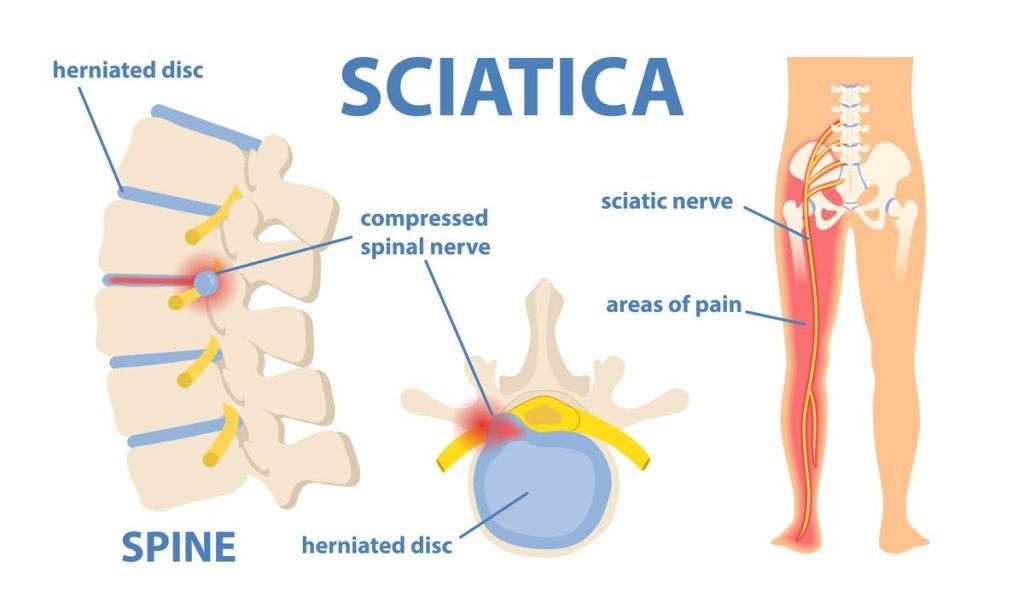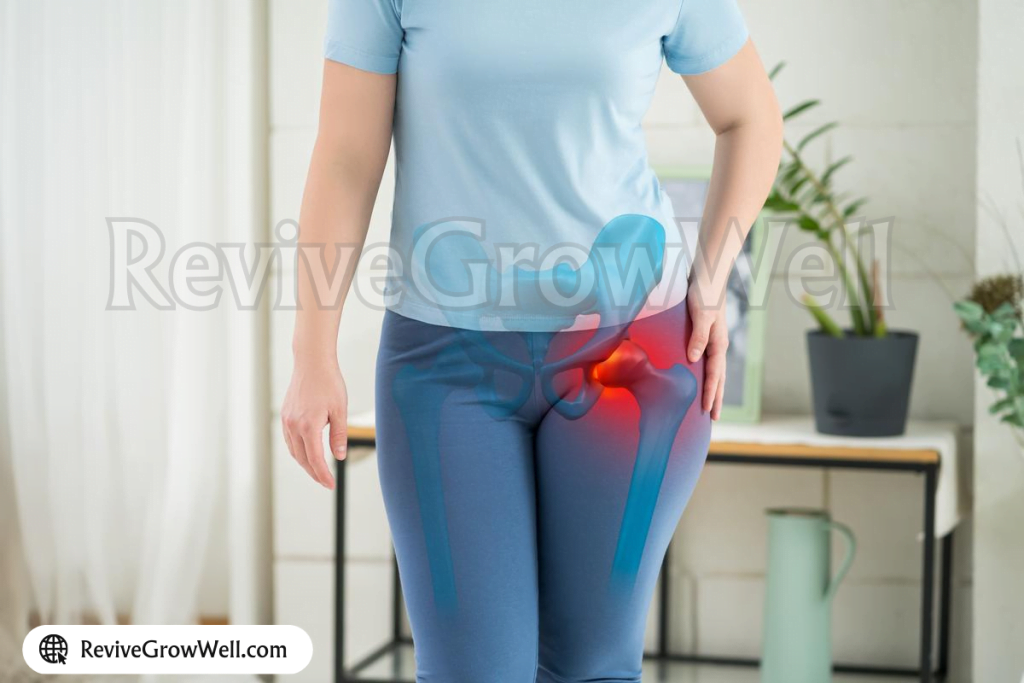Table of Contents
Introduction
Imagine having hip pain that shoots down your leg, making it difficult to move and do everyday activities. This kind of pain can really disrupt your life and make you feel uncomfortable. Sometimes, it feels like a sharp or dull ache that travels from your hip all the way down to your knee, calf, or even your foot! It’s essential to figure out why this happens so that we can find ways to make it feel better. In this article, we’ll explore the reasons behind this hip pain that radiates down the leg and look at some ways to treat it differently. Let’s get started!

1. Sciatica: The Nerve Pain Culprit That Causes Hip Pain Radiating Down the Leg
Have you ever heard of sciatica? It’s a kind of pain that can happen in your hips and legs. The main reason for this pain is a big nerve called the sciatic nerve. This nerve goes from your lower back down to your legs. It’s the biggest nerve in your whole body!
Sometimes, when the sciatic nerve gets squished or irritated, it causes a sharp, shooting pain that goes from your hip all the way down to your knee, calf, or foot. Ouch! There are a few things that can squish this nerve, like a problem with a disc in your back, or if something narrows the space where the nerve travels.
Sitting or standing for a long time can make the pain worse. It’s important to know why sciatica happens and how it affects your hip joint. If you have this kind of pain, it’s a good idea to talk to a doctor. They can help you with treatments like exercises and techniques to manage the pain. They might also suggest some changes in your daily life to help you feel better.
With this knowledge and help from doctors, you can take steps to feel better and get rid of hip pain that radiates down the leg and enjoy your life more!
2. Hip Joint Problems: Understanding the Root of Radiating Hip Pain
Having problems with your hip joint can cause a lot of pain that goes down your leg and makes it hard to do everyday things. The hip joint is a complicated part of your body made up of the femur (the thigh bone) and the pelvis. It helps you move smoothly and support your weight.
Sometimes, things can go wrong with this important joint, and that can make it uncomfortable to move and do the things you love. One common problem is called osteoarthritis, which happens when the cartilage supporting the joint wears away. This causes the bones to rub against each other, leading to pain that spreads down your leg, making it tough to do even simple movements.
Another issue that can cause hip pain is called a hip labral tear. The labrum is a ring of cartilage that helps keep the hip joint stable. If this gets torn, it can cause a sharp pain that goes down your leg when you move.
It’s essential to recognize and take care of these hip joint problems early to protect yourself from hip pain that radiates down the leg. Getting help from a professional and following the right treatments can ease the pain, improve your hip joint’s work, and help you live an active and pain-free life.

3. Bursitis: Inflammation Woes
Bursitis is a painful problem that can happen in your hip. Your hip joint has small sacs filled with fluid called bursae that help protect the bones, tendons, and muscles. Sometimes, these sacs get swollen and hurt when we do the same movements over and over, use our hip too much, or if we get injured.
When you have bursitis, it can be really uncomfortable and make it hard to do everyday things like walking or going upstairs. The pain starts in the hip and goes down the leg. If you notice pain, swelling, or warmth around your hip, you might have bursitis and should get help from a doctor as soon as possible.
To feel better, you can rest, use ice packs on your hip, and avoid activities that make the pain worse. Doctors might also give you special treatments and medicines to reduce the swelling and help you heal faster.
It’s important to know about bursitis so you can take care of your hip and stay active. By learning about it and getting help early, you can move better and have a happier, healthier life.
4. Piriformis Syndrome: The Hidden Culprit
Have you ever heard of something called “Piriformis syndrome“? It’s a sneaky problem that can cause pain in your hip and leg. Deep inside your buttocks, there’s a muscle called the “piriformis,” and it helps keep your hip joint stable and lets it move properly. But sometimes, this muscle gets tight or goes into spasms, and that’s when trouble starts! You feel hip pain that radiates down the leg.

You see, the piriformis muscle can annoy a nearby nerve called the “sciatic nerve.” When this happens, it sends sharp pain shooting down your leg. It’s like a hidden troublemaker! The tricky part is that people often confuse this pain with other hip or back problems, so it takes a while to figure out what’s really going on.
If you have Piriformis syndrome, you might feel pain, tingling, or numbness in your buttocks and down your leg. It can get worse if you sit for a long time or keep doing the same movements over and over again.
The good news is, once doctors know what’s causing the pain, they can help you feel better. They might give you exercises to stretch the piriformis muscle, suggest physical therapy, or teach you some ways to relax those muscles. By understanding this sneaky culprit, you can get the right treatment and go back to your active, pain-free life!
5. Hip Fractures: A Serious Concern
Hip fractures are a really serious problem that can cause a lot of pain in your hip and leg. They usually happen to older people, especially if their bones are weak from a condition called osteoporosis. When you fall or get hurt directly in the hip, it can break, and that’s when the pain starts. You won’t be able to walk properly or move comfortably because of the hurt.
It’s super important to know the signs of a hip fracture so you can get help right away. Look out for really bad pain in your hip, not being able to put weight on your leg, and seeing swelling or bruising around your hip.
To avoid getting a hip fracture, it’s good to take care of your bones. Eat healthy food, exercise, and see the doctor regularly to make sure everything’s okay.
If you do get a hip fracture, don’t worry! There are treatments like surgery and rehab to help you get better and move again. By knowing about hip fractures and taking care of yourself, you can stay safe and keep yourself and your family healthy and happy.”
6. Muscle Strains: Overexertion Matters
Muscle strains are a common culprit behind hip pain that radiates down the leg. Sometimes, our hip can hurt, and it’s often because of something called ‘muscle strains.’ These happen when we push our bodies too hard during physical activities like lifting heavy things or doing intense workouts. When this happens, the muscles in our hip area can get stretched or torn, and it puts a lot of pressure on the hip joint. That pressure causes pain that can shoot down our leg. The pain might feel sharp and make it hard to move or do regular things.
It’s important to recognize the signs of muscle strains, like when the hip feels sore, swollen, or you can’t move it much. If you feel this kind of pain, you should take care of it right away. You can rest your hip, put ice packs on it, and do some gentle stretches to help it heal. It’s also good to be careful not to strain it more and to get back into activities slowly.
By being mindful of how much we push ourselves and taking good care of our hips, we can keep them healthy and reduce the chances of feeling that radiating pain. This way, we can enjoy being active without hurting ourselves.
7. Infection and Inflammation
Hip pain that radiates down the leg can happen when there’s an infection or swelling in the hip joint or around it. This can make it hard to move and feel uncomfortable. One common problem is called “septic arthritis,” where germs infect the hip joint, make it painful and swollen, and cause a fever. It’s crucial to see a doctor quickly to stop the infection from hurting the joint too much and get better fast.
Another reason for hip pain is “bursitis.” Little sacs filled with fluid around the hip joint help cushion it. If these sacs get swollen because of doing the same movements a lot or from getting hurt, it can also cause pain that goes down the leg.
It’s important to find out early if you have these problems and get treated by a doctor. This way, you can avoid more serious issues, make your hip feel better, and move easier. Following the doctor’s advice and treatment plan can help you heal and feel better quickly.
8. Nerve Entrapment: Unraveling the Source of Hip Pain Radiating Down the Leg
Sometimes, hip pain can spread down your leg because of something called ‘nerve entrapment.’ It’s when some nerves around your hip and leg get squished or stuck, and they send signals to your brain, causing sharp or tingling feelings along the path of the affected nerve.
One kind of nerve entrapment is called ‘sciatica.’ It happens when the sciatic nerve, which goes from your lower back through your hips and down each leg, gets irritated or pinched. This can be because of a bulging disc in your back, a narrow space in your spine, or tightness in a certain muscle.
Another type is ‘Meralgia Paresthetica.’ It occurs when a different nerve in your hip gets compressed, causing burning or tingling sensations down your outer thigh.

If you ever feel this kind of hip pain, it’s important to tell an adult so they can help you see a doctor. Recognizing these signs and getting the right help can make a big difference in managing and treating this kind of hip pain, so you can feel better and do all the things you enjoy.
9. Referred Pain from Lower Back
Have you ever felt pain in your hip that goes all the way down your leg? It’s like the hip pain is spreading down the leg, and it can be puzzling. Well, this happens because our lower back and hip are connected in a special way.
Imagine your back is like a big road that has lots of tiny nerves traveling to different parts of your body. Sometimes, something can go wrong with the road, like a bump or a blockage. When that happens, the messages the nerves send to your brain get mixed up.
So, even though the problem might be in your lower back, your brain thinks the pain is coming from your hip and leg instead. This can be confusing because you might only feel pain in your hip, but that’s not the real source of the trouble.
It’s important to know this because if you only treat your hip pain, the real problem in your lower back won’t get better. You need to look at both the hip and the lower back to figure out what’s causing the pain.
You can talk to a doctor who can help you understand how your back and hip are connected. They can give you the right treatments to fix hip pain that radiates down the leg, making you feel better in the long run.
So, remember, if you ever feel hip pain that radiates down your leg, it might be connected to your lower back. Talk to a grown-up or a doctor so they can help you feel better!
10. Pregnancy-Related Hip Pain: Understanding the Burden of Radiating Discomfort
Being pregnant is a beautiful journey, but it can bring some physical challenges. One of these challenges is hip pain that goes down the leg. When a woman is pregnant, her body goes through a lot of changes to make space for the growing baby. These changes can put extra pressure on the hip joint, which is the place where the leg connects to the body. There’s a special hormone called “relaxin” that helps prepare the body for childbirth, but it can also make the hip joint less stable and cause pain when moving.

Imagine carrying a heavy backpack on your back, and it’s pulling you slightly forward. That’s a bit like what happens to pregnant moms. The growing belly changes their balance, and they lean more on their hips, which can make them sore.
So, sometimes pregnant women feel pain starting from their hips and going down their leg. It can be a sharp pain or just a dull ache.
But don’t worry. There are ways to help with this pain! Doing gentle exercises that don’t strain the hips too much can be helpful. Also, sitting and standing in the right way can make a big difference. And, of course, doctors and nurses can give advice and support to make pregnant moms feel more comfortable.
By knowing how to take care of their hips, pregnant moms can have a happier and more enjoyable time while waiting for their baby to be born.
11. Nerve Damage and Neuropathy: The Hidden Causes of Hip Pain Radiating Down the Leg
Did you know that hip pain can sometimes travel down the leg? This happens because of a problem with the nerves in our hip and leg. Nerves are like little messengers that carry signals from one part of our body to our brain.
When these nerves get hurt, it can cause weird feelings and pain. This kind of nerve damage is called “peripheral neuropathy.” It can be caused by things like diabetes, not getting enough vitamins, or certain medicines.
Imagine your nerves sending wrong messages to your brain, like saying “ouch” when there’s no reason to feel hurt! That’s what happens with this kind of nerve damage. It can make you feel burning, tingling, or sharp pain from your hip pain radiating down the leg.
People with diabetes are more likely to have this kind of hip pain. But don’t worry; there are some ways to help!
First, doctors need to find out if it’s really nerve damage causing the pain. Once they know for sure, they can treat the root cause. For example, if it’s because of diabetes, they’ll help manage that. They might also give special medicines to ease the nerve pain.
In some cases, they might suggest making changes to your lifestyle, like eating healthier and being more active, to make you feel better.
So, remember, if you have hip pain that radiates down your leg, it could be because of nerve damage. See a doctor, and they’ll help you find the best way to feel better and stay healthy!
12. Overweight and Obesity: The Weighty Factors Behind Radiating Hip Pain
Having extra weight can really affect our health, and one part of our body that feels it a lot is our hips. When we are overweight or obese, it can make our hips hurt, and that hip pain radiates down the leg. It’s like having a big burden on our hip joints, and it wears them down.
This can cause a condition called osteoarthritis, which makes our hips swollen and painful, and the pain goes down our legs too. Another problem is when the pressure on the hip squeezes a nerve called the sciatic nerve, and that can cause a condition called sciatica, which also makes our leg hurt a lot. So, it’s very important to take care of our weight to keep our hips healthy and prevent this kind of pain.
Eating healthy food and staying active with exercise can help us lose extra weight, which takes away the burden on our hips and makes the pain go away. When we take care of our bodies, especially our hips, we can feel better and do more fun things without any pain.
Maintaining a healthy weight is crucial for managing hip pain; you can explore the benefits of Keto ACV Gummies to support your ketogenic lifestyle and weight management
13. Iliotibial Band Syndrome
Do you sometimes feel pain in your hip that goes down your leg? Well, that’s called “Iliotibial Band Syndrome.” Let me explain what it means! It’s the reason behind hip pain that radiates down the leg.
Your body has something called the “iliotibial band,” or IT band for short. It’s like a thick rubber band that goes along the outside of your thigh, connecting your hip to your knee. When you do activities like running or cycling too much, the IT band can get tight and inflamed, causing pain.
Imagine the IT band as a tight belt around your thigh. As you move your leg, it rubs against the bony part of your hip, and that can make you feel uncomfortable and achy. Sometimes, the pain can be sharp, especially when you’re doing sports or going downstairs.
But don’t worry! If you notice this pain early, you can do things to make it better. Resting your leg and doing specific stretches and exercises to strengthen your muscles can help. By paying attention to what our bodies tell us and taking care of ourselves, we can manage this condition and keep having fun doing sports and other activities without pain.
So, remember, if you ever feel hip pain that radiates down the leg, it might be the IT band causing it. Talk to a grown-up about it; they can help you feel better and stay active!
14. Occupational Hazards
Hip pain that radiates down the leg can happen to people who do certain jobs. These jobs might make them sit or stand for a long time. For example, truck drivers, nurses, security guards, and office workers may feel this pain because their hips get strained from sitting too much. When you sit a lot without moving, your hip muscles can become stiff and tight, causing discomfort. And if you stand for long periods while on duty, you might have injuries and inflammation in your hip area.
Some jobs involve doing the same movements repeatedly or lifting heavy things. These activities can put a lot of pressure on the hip joints and muscles, leading to pain that goes down the leg. This pain can make it hard for people to do their daily tasks.
Both workers and employers need to be aware of these issues. They can make changes to the workplace to help prevent hip pain. For example, they can adjust how chairs and desks are set up to make sitting more comfortable. They can also encourage people to take breaks and stretch regularly to prevent stiffness. Promoting good body movements and habits can reduce the risk of hip pain and keep workers healthy and happy.
So, by paying attention to workplace safety and encouraging healthy practices, we can ensure fewer people experience hip pain because of their jobs. This will create a better work environment where everyone can feel good and do their best.
15. Traumatic Injuries: Unraveling the Causes of Hip Pain That Radiates Down the Leg
Sometimes, when people have accidents or falls, they can hurt their hips, which are the bones in their upper legs. This can cause a lot of pain that starts in the hip and goes down the leg. It’s like when you feel pain in one spot but it spreads to another part of your body.
One common injury that causes this kind of hip pain is when the hip bone breaks because of a strong impact, like in a bad fall or during sports. This is especially risky for older people and those with weaker bones. When the hip bone breaks, it really hurts, and it’s tough to move around.

Another type of injury that can lead to hip pain down the leg is when the hip joint gets dislocated. This happens when a very strong force or movement makes the hip bones move out of their normal place. This can cause pain that travels down the leg.
Sometimes, it’s not just the bones that get hurt; the soft tissues around the hip can also be injured. Soft tissues are like the muscles and ligaments that help our bodies move. When these tissues get strained or sprained, they can cause hip pain that goes down the leg, especially when you move.
So, to understand all of this, remember that accidents or falls can cause hip pain. The pain can spread down the leg because of broken bones, dislocated joints, or injuries to the soft tissues. If this ever happens to you or someone you know, it’s really important to see a doctor right away so they can help with the pain and healing process.
Stay safe, and take care of your body!
Conclusion
Hip pain that goes down the leg can happen for many reasons. It might be because of nerves getting squeezed, problems with the hip joint, injuries, or medical issues. Finding out what’s causing the pain is important so that doctors can give the right treatment and help people feel better. If you have hip pain that keeps happening and goes down your leg, it’s very important to see a doctor. They can figure out what’s happening and help you manage the pain, so you can do more without hurting. Remember, with the right help, you can take charge of your hip pain and enjoy an active and pain-free life.
For more information on supporting your health and well-being, check out our posts on Keto ACV Gummies and Apple Cider Vinegar and Lemon Juice.”
FAQs About What Causes Hip Pain That Radiates Down the Leg:
Are you experiencing persistent hip pain that shoots down your leg, making it difficult to move or carry out your daily activities? If so, you’re not alone. Hip pain that radiates down the leg can be a distressing and debilitating condition that affects many individuals. Now, we’ll explore some frequently asked questions about the causes of hip pain that radiates down the leg and provide valuable insights and solutions to address this issue effectively.
Q 1. Can hip pain radiating down the leg be a sign of a serious condition?
A: Yes, hip pain radiating down the leg can indicate underlying medical conditions, some of which may require immediate medical attention.
Q 2. Is rest beneficial for alleviating hip pain?
A: In some cases, resting the affected hip can help reduce pain, especially if it’s caused by overuse or strain.
Q 3. How is sciatica diagnosed?
A: A medical professional may diagnose sciatica based on the patient’s symptoms, medical history, and physical examination. Additional tests like X-rays or MRI scans may be used to confirm the diagnosis.
Q 4. Can stretching exercises help with hip pain?
A: Stretching exercises targeting the hip and leg muscles can improve flexibility and sometimes alleviate discomfort.
Q 5: What are the common causes of hip pain that radiates down the leg?
A: Hip pain that radiates down the leg can be caused by various factors, including sciatica, hip joint issues, muscle strains, bursitis, and herniated discs in the spine.
Q 6: How do I differentiate between sciatica and hip joint pain?
A: Sciatica pain usually originates in the lower back and travels through the buttock and the leg. On the other hand, hip joint pain often manifests in the groin area and may cause discomfort in the thigh or knee.
Q 7: Can muscle imbalances lead to hip pain that radiates down the leg?
A: Muscle imbalances around the hip and lower back can strain the sciatic nerve or the hip joint, leading to pain that radiates down the leg.
Q 8: Is hip pain that radiates down the leg more common in certain age groups?
A: While hip pain can affect people of all ages, it is more commonly observed in older adults due to age-related wear and tear on the joints.
Q 9: How can I prevent hip pain from occurring?
A: Regular exercise to strengthen the core and hip muscles, maintaining a healthy weight, practicing good posture, and avoiding prolonged sitting can help prevent hip pain.
Q10: When should I seek medical attention for hip pain?
A: If you experience severe pain, sudden injury, or loss of mobility, or the pain persists for an extended period, it is crucial to consult a healthcare professional for a proper diagnosis and treatment plan.
Q11: What are some effective at-home remedies for hip pain relief?
A: Applying ice packs, doing gentle stretches, taking over-the-counter pain relievers, and resting the affected area can temporarily relieve mild hip pain.
Q12: Can physical therapy help with hip pain that radiates down the leg?
A: Physical therapy can be highly beneficial in addressing hip pain. A skilled therapist can design a customized exercise plan to strengthen the muscles, improve flexibility, and alleviate pain.
Q13: Are there any lifestyle changes that can reduce the risk of hip pain?
A: Maintaining a healthy lifestyle, including regular exercise, a balanced diet, avoiding smoking, and managing stress, can significantly reduce the risk of hip pain.
You Might Also Like























3 thoughts on “What Causes Hip Pain That Radiates Down The Leg”
Wow, this was such a helpful read! The information you’ve shared is not
only practical but also very relevant for anyone trying to improve their health.
I love how you kept things simple. I’m going to share this article on my
own blog about healthy eating – I know my audience will find it just as valuable.
Thanks for the great work
Thank you so much for your kind words! I’m really glad you found the article helpful and relevant. My goal is to provide practical, easy-to-understand information that can truly make a difference in people’s health, so it’s wonderful to hear that it resonated with you.
I truly appreciate your support and for sharing the article with your audience. If there’s anything else you’d like to see covered or discussed, feel free to let me know!
Thanks again, and best of luck with your own blog about healthy eating!
My spouse and i felt so contented that Albert could do his research because of the precious recommendations he had using your site. It’s not at all simplistic to simply choose to be giving freely instructions that many some other people could have been trying to sell. And we all keep in mind we have you to be grateful to because of that. Most of the illustrations you have made, the straightforward blog menu, the friendships you can assist to foster – it’s got all superb, and it’s really helping our son and us believe that this theme is awesome, which is tremendously fundamental. Thank you for the whole lot!